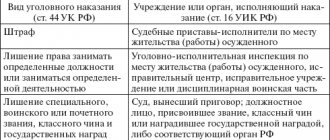Concept, subject and method of administrative law
Administrative law is a branch of law that regulates public relations in the field of public administration.
The subject of administrative law is management relations that arise, change and cease in connection with the practical implementation of the executive power of the state.
Features of the relations that constitute the subject of administrative law are as follows:
- arise, develop and cease in the sphere of state regulation of socio-economic and socio-political life;
- mediate the state policy of recognition, respect and protection of human and civil rights and freedoms, enshrined in the Constitution of the Russian Federation, creating conditions for a decent life and free development of the individual;
- constitute the content of a special type of state activity for the practical implementation of executive power (state management activity);
- express the priority of public legal interests in the regulated sphere and the corresponding state legal means of influencing public relations.
The method of administrative law is characterized by legal means designed for relations of power - subordination, that is, with the participation of unequal parties; expressed in legal means of an administrative type, that is, in instructions and prohibitions addressed to the other party; presupposes the one-sided expression of the will of one of the participants, which is legally powerful and therefore of decisive importance.
The structure of the main elements of this branch of law, contained in its sources, forms a system of administrative law. The sources of administrative law include the Constitution of the Russian Federation, federal laws, decrees of the President of the Russian Federation and resolutions of the Government of the Russian Federation, regulatory acts of federal ministries and departments, legislative and regulatory acts of constituent entities of the Russian Federation and local governments. Unlike most other branches of Russian law (civil, labor, criminal, etc.), administrative law is one of the least systematized branches. Currently, the Code of the Russian Federation on Administrative Offenses of the Russian Federation dated December 30, 2001 No. 195-FZ (as amended on December 31, 2014) (Administrative Code of the Russian Federation) codifies only one institution of administrative law - the institution of administrative offense (administrative tort law, which will be the subject of consideration in this chapter).
What relationships are the subject of the industry?
Any area of normative coordination is a set of certain norms that regulate similar types of interaction. They, in turn, are an industry subject. The relationship between administrative law and other branches of law can only be studied through a detailed examination of the types of relations that are regulated by this legal sphere. Thus, the following types of administrative relations are distinguished, namely:
- procedural and material;
- relations within government bodies, as well as between them and other subjects of the domestic legal system;
- positive relationships and delinquency.
These represented groups are the main ones in the administrative branch. Of course, over time, relationships of a different, more progressive nature may appear. This, in turn, will also bring certain changes to the relationship of administrative law with other branches of law.
Concept, subject and method of criminal law
Criminal law is a branch of law that regulates social relations related to crime and the punishability of acts. The term "criminal" comes from the word "head". In Ancient Rus', a murderer was called a golovnik, and the murder itself was called a golovshchina. Therefore, initially the term “criminal” meant “something related to the murdered person, to the murder victim,” and only over time the meaning of this word shifted from the figure of the victim to the criminal and began to be used not only in relation to murder, but also in relation to other especially dangerous acts, for the commission of which it was supposed to be “responsible with one’s head,” that is, crimes.
Criminal law has its own specific tasks and subject of legal regulation.
The tasks facing the criminal law of the Russian Federation include the following:
- protection of human and civil rights and freedoms, property, public order and public safety, the environment and the constitutional system of the Russian Federation;
- ensuring peace and security of mankind;
- crime prevention.
Thus, the subject of criminal law is social relations arising in connection with the commission of a crime by a person and the application of criminal punishment to him.
The criminal law method is based on the following legal principles.
- The principle of legality, meaning that a person who has committed a crime must be punished within the limits and amounts provided for by the Criminal Code of the Russian Federation (CC RF). In other words, the classic formula of world criminal legislation is reproduced: “there is no crime and there is no punishment without a direct indication of this in the law.” The application of criminal law by analogy, that is, in cases not directly provided for by criminal law, is not allowed.
- The principle of equality of citizens before the criminal law, specifying that enshrined in Art. 19 of the Constitution of the Russian Federation the principle of equality of all before the law and the court. A person who has committed a crime is subject to criminal liability regardless of gender, race, nationality, language, origin, property and official status, religious beliefs, etc. The only criterion when deciding whether to bring a person to criminal liability is the presence of signs in the act committed by him corpus delicti.
- The principle of guilt, consisting of subjective imputation and the personal nature of criminal liability. Subjective imputation means holding a person criminally liable only for culpably causing harm to them. The personal nature of criminal liability is that a person is responsible only for the act that he himself committed.
- The principle of justice, which consists in the compliance of criminal punishment and other measures of criminal law applied to a person who has committed a crime, the nature and degree of public danger of the crime he has committed, the circumstances of its commission and the identity of the perpetrator. In addition, part 2 of Art. 6 of the Criminal Code of the Russian Federation reproduces the principle of Part 1 of Art. 50 of the Constitution of the Russian Federation that no one can be convicted again for the same crime.
- The principle of humanism, manifested in criminal law in two aspects: firstly, in establishing the most severe punishments for serious and especially serious crimes; and secondly, in protecting the rights and interests of the person who committed the crime, by punishing whom the state does not take revenge for the crime committed, but pursues only the goals of restoring social justice and solving the problem of preventing new crimes.
The structure of the main elements of the branch of criminal law contained in the criminal law forms the system of criminal law. The criminal law is represented by a single codified legal act - the Criminal Code of the Russian Federation dated June 13, 1996 No. 63-FZ (as amended on July 21, 2014). The Criminal Code of the Russian Federation is the only source of Russian criminal legislation. New criminal laws cannot be of an independent nature, but represent only changes and additions to the current Criminal Code of the Russian Federation.
What is the ratio of areas of regulation?
The branches of Russian law, as we understand, are not homogeneous. They all have certain specific characteristics. For example, the procedural branches of Russian law exclusively coordinate relations that arise in the sphere of activity of the courts at the time of consideration of certain proceedings. In turn, branches of substantive law extend their effect to ordinary relations not related to the court and proceedings of a certain type. In this case, the relationship between legal spheres is the moment of their point of contact in certain issues. Administrative law regulates its own subject, but other branches complement it in certain legal aspects.
What is the relationship between land and administrative law?
There are many specific industries in the Russian Federation. They all have their own subject of regulation. At the same time, the relationship between land and administrative law is difficult to consider due to the different orientations of these industries. However, the issue can be studied from two perspectives.
- Administrative law determines the degree of punishment for violations that involve land itself. This is due to the fact that the state recognizes land as one of the main goods.
- The management industry regulates relations related to the process of transferring land for use and ownership to private individuals.
Civil and administrative law: features of the relationship
Civil law is the most ancient and authoritative legal branch today. Its norms cover relations that are associated with property and the process of its sale, purchase, acceptance as a gift, transfer, etc. The administrative branch regulates the procedure for licensing and control of such activities, especially if they are carried out in the sphere of activity of public authorities. Otherwise, administrative and civil law are completely different. After all, the spheres of regulation are representatives of the public and private sides of the legal system of our state.
Exemption from administrative liability
Legislation, based on the principles of democracy, humanity, economy of state coercion and the consistent use of persuasion, provides for the possibility of releasing persons who have committed offenses from one or another type of legal liability.
The Code of Administrative Offenses (Article 2.9) establishes the grounds, conditions and consequences of exemption from administrative liability of persons who have committed administrative offenses if the offense is of minor importance. Exemption from administrative liability may also manifest itself in replacing it with another type of liability (for example, disciplinary liability). Essentially, in these cases, in one form or another, the judge, authorized bodies and officials exempt those who have violated legal regulations from administrative liability.
A kind of “exemption” from administrative liability is the passage by the jurisdictional body and its officials, for one reason or another, of the statute of limitations for imposing an administrative penalty, i.e., bringing the perpetrator to administrative responsibility.
Article 4.5 of the Code of Administrative Offenses establishes a statute of limitations for imposing an administrative penalty. As a general rule, a decision in a case of an administrative offense cannot be made after two months from the date of the offense, and if the offense was ongoing (violation of military registration rules, living without registration, evasion of re-registration of a hunting rifle, etc.), then no later than two months from the date of its discovery.
This article also provides for a different statute of limitations for bringing to administrative liability for violation of the legislation of the Russian Federation on internal sea waters, the territorial sea, the continental shelf, on the exclusive economic zone of the Russian Federation, on the protection of the rights and legitimate interests of investors in the securities market, antimonopoly, customs, and tax laws. , currency, environmental and a number of other legislative acts. It is one year from the date of commission of the administrative offense, and for a continuing offense - one year from the date of its discovery.
The legislation establishes a system of “flexible response” to administrative offenses and does not require that every offense necessarily entail administrative liability even within the statute of limitations. If the administrative offense is insignificant, the judge, body (official) authorized to resolve the case may generally release the offender from administrative liability and limit himself to an oral remark. This provision of the law means that the judge, body (official), authorized to decide the case on the merits, has the right to apply to the violator such a means of influence, which is not an administrative punishment and does not relate to measures of social influence. At the same time, it is quite obvious that oral comments made to the offender do not entail legal consequences.
The main thing is that when deciding on the release of a violator from administrative liability, all objective and subjective aspects of the offense, mitigating and aggravating circumstances, should be carefully taken into account.
In a number of cases, an administrative offense entails, as an exception, not administrative, but disciplinary liability. Military personnel, employees of internal affairs bodies and other persons who are subject to disciplinary statutes are liable for administrative offenses, as a rule, according to disciplinary statutes (provisions), except for offenses for which liability arises on a general basis (Article 2.5 of the Administrative Code) .
Taking into account the specific circumstances of the case and data about the person who committed an administrative offense at the age of 16 to 18 years, the commission on affairs of minors and the protection of their rights, this person may also be released from administrative liability with the application to him of a measure of influence provided for by federal legislation on protection rights of minors (Article 2.3 of the Administrative Code).
A specific temporary exemption from administrative liability is provided for in Art. 31.5 of the Code of Administrative Offences, deferment of execution of a decision to impose an administrative penalty.
If there are circumstances due to which the execution of the decision to impose an administrative penalty in the form of administrative arrest, deprivation of a special right or in the form of an administrative fine (except for the collection of an administrative fine at the place where the administrative offense was committed) is impossible within the established time frame, the judge, body, official who issued decision may delay execution of the decision for up to one month.
In terms of content and legal consequences, exemption from administrative liability is similar to the circumstances that exclude proceedings in a case of an administrative offense, i.e. they are united by the illegality of the act and the possibility of prosecution, which directly relates to extreme necessity (Article 2.7 of the Code of Administrative Offenses). Indeed, the content of the situation is an administrative offense, and the legal consequences (result) ultimately coincide and consist in the refusal of the jurisdictional body or official to bring this or that citizen to administrative responsibility.
At the same time, the grounds for exemption from administrative liability and the circumstances excluding the illegality of the act differ significantly: in one case, it is the insignificance of the offense committed or the peculiarities of the nature of the offense and the personality of the offender, and in the other, it is an extreme necessity.
A person who acted in a state of extreme necessity is not subject to administrative liability. If, for example, the driver of a car is driving a person in need of emergency medical care to the hospital while exceeding the speed limit, then he will not be punished for speeding, since he is acting in a situation of emergency.
In accordance with Art. 2.8 of the Administrative Code excludes administrative liability in relation to the insane. An individual who, at the time of committing illegal actions (inaction) was in a state of insanity, is not subject to administrative liability, i.e. could not realize the actual nature and illegality of his actions (inaction) or manage them due to a chronic mental disorder, temporary mental disorder, dementia or other painful mental state.
There is an institution for limiting administrative liability. These restrictions are primarily related to the characteristics of subjects of administrative offenses, provided for by administrative legislation or taken into account by law enforcers within the framework of administrative discretion. In particular,
The Code of Administrative Offenses excludes the possibility of applying certain administrative penalties depending on certain characteristics of the subject of the administrative offense.
Thus, administrative arrest (Article 3.9 of the Code of Administrative Offenses) cannot be applied to pregnant women, women with children under the age of 14, persons under 18 years of age, disabled people of groups I and II. Deprivation of the right to drive vehicles cannot be applied to persons who use these vehicles due to a disability, with the exception of cases of driving while intoxicated, evading a medical examination for intoxication in the prescribed manner, as well as leaving a place in violation of established rules a traffic accident in which they are a participant (Article 3.8 of the Administrative Code).
Deprivation of the right to hunt cannot be applied to persons for whom hunting is the main legal source of livelihood; they cannot be subject to confiscation of firearms and ammunition.
The law provides for restrictions on the application of administrative penalties against military personnel and certain other persons: judges, prosecutors, persons enjoying parliamentary immunity, foreign citizens who have immunity and privileges from administrative jurisdiction on the territory of the Russian Federation.
What branches does administrative law relate to?
The legal system of the Russian Federation contains a large number of completely different areas of regulatory regulation. The relationship of administrative law with other branches of law under such circumstances is quite difficult to study. After all, it closely interacts with many existing legal categories. However, the most striking relationship between administrative law and other branches of law can be analyzed using the example of its relationship with the constitutional, civil, criminal, financial and land sectors. Of course, in this case we should not forget about the large role of the administrative process, because it was created on the basis of the managerial sphere of regulation and its subject norms.
The relationship between the financial regulatory and administrative industries
Government regulation is directly related to “monetary” activities. Thanks to the financial component, the country provides its population with social services, heat, food and other similar benefits. Administrative law and financial law are directly related to this process. The relationship between these industries is quite interesting.
- Firstly, the financial industry arose much later than the administrative one. Therefore, many norms of the first category are similar to the institutions of the sphere of regulation discussed in the article.
- Secondly, the subject matter of both industries overlaps. Financial law regulates the use of budget funds by public authorities, and directly administrative law regulates their activities.
- Thirdly, administrative and financial law regulates the relations within their competence through a single, imperative method.
Thus, the connection between both industries is quite strong. Therefore, in some cases, people confuse the rules of administrative and financial law. As we understand, this negative factor causes a large number of unforeseen situations.







